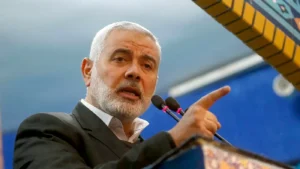The assassination of Hamas top leader Ismail Haniyeh on Wednesday will most likely be the boost Israeli Prime Minister Benjamin Netanyahu has been desperately looking for in this 10-month unprecedented genocidal war against the Palestinians.
Or this is how it might seem.
For Hamas affiliates, and many Palestinians would agree with them, martyrdom is not a loss. In the Islamic doctrine, martyrdom is one of two successful outcomes in the struggle for truth and justice; the other is victory.
When the Islamic Resistance Movement, Hamas, was born out of the womb of the Palestinian Muslim Brotherhood organisation in December 1987, Haniyeh was a young cadre, who was about to turn 25.
Yet, like many of his Islamic comrades, he was born a leader. Since his birth on 23 December 1962 to a refugee family that fled its homeland in Palestine, close to the city of Ashkelon during the Nakba of 1948, he grew up and lived in Al-Shati refugee camp in the north of the Gaza Strip.

